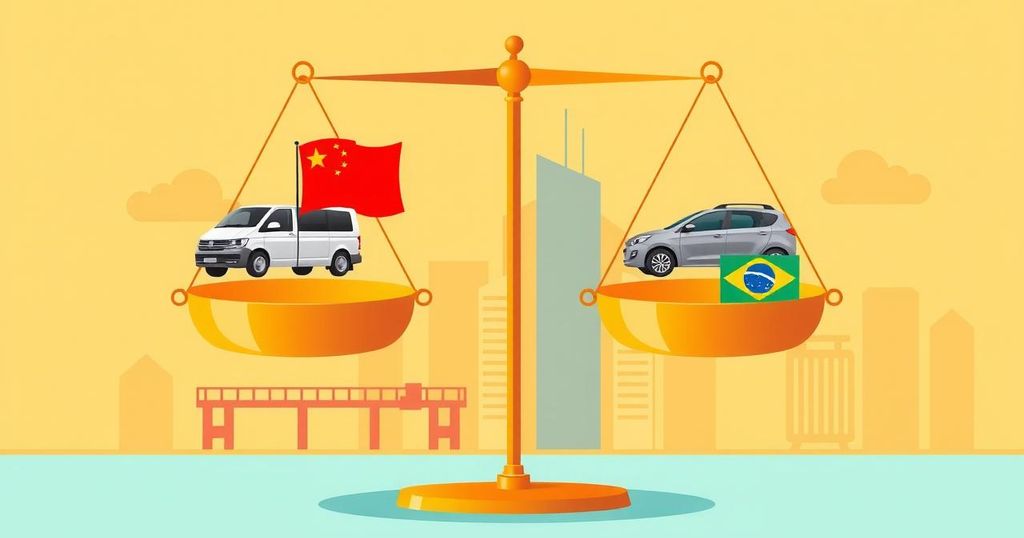Brazilian Automotive Association Advocates Higher Tariffs on Chinese Imports
The Brazilian automotive association Anfavea is seeking a higher tariff on Chinese vehicle imports, arguing that reinstating the 35-percent tariff is essential to avoid trade imbalance effects on production and employment. With Brazil’s automotive market facing challenges from low import tariffs, the association emphasizes the need for protective measures to encourage local investments, particularly in the growth of electric vehicle production.
The National Association of Automotive Vehicle Manufacturers (Anfavea) in Brazil is advocating for a tariff increase on Chinese vehicle imports, in light of a significant influx of electric and hybrid vehicles. According to reports from Istoé Dinheiro, Anfavea is urging the government to reinstate the 35-percent tariff previously reduced last year to prevent any foreign trade imbalance that could adversely impact production, investments, and jobs within the Brazilian automotive sector.
Anfavea has raised these concerns since the Brazilian government’s decision to slash tariffs on electric vehicles (18 percent), plug-in hybrids (20 percent), and other hybrids (25 percent) in July. The organization emphasizes that Brazil’s import barriers are significantly lower than those in countries with established automotive industries, which could jeopardize local manufacturers.
With Brazil being the sixth-largest car market globally, Anfavea insists that maintaining low tariffs makes the nation an attractive target for foreign manufacturers. Even raising tariffs back to 35 percent would still leave Brazil behind regions like the European Union, where tariffs are as high as 48 percent, and the US and Canada, where they can reach 100 percent.
Anfavea contends that the influx of imports undermines Brazil’s automotive industry, which is only just recovering from prolonged economic difficulties and the effects of the Covid-19 pandemic. The association highlights the importance of a balanced trade environment to stimulate investment, particularly in electric vehicle production, targeted for an investment of 180 billion reais (approximately US$31.27 billion).
Although there are concerns regarding Chinese importation, Anfavea supports investments from global automotive leaders like BYD and Great Wall Motor in Brazilian production. They caution that retaining low tariffs may impede such investments and ultimately hinder job creation in Brazil.
The new BYD factory, which is currently under construction in Bahia, is projected to generate approximately 10,000 jobs upon opening. This figure exceeds the number of positions lost at Ford due to its plant closures. BYD’s establishment is set to significantly enhance automotive production capacity in Bahia, anticipating growth from 150,000 to 300,000 units by 2028.
In conclusion, the National Association of Automotive Vehicle Manufacturers in Brazil is advocating for an increase in tariffs on Chinese vehicle imports to protect the domestic automotive industry from a flood of low-cost imports. Anfavea’s urgent call highlights the need for balanced trade practices to sustain investments and job creation within the sector. While it welcomes foreign investments, it urges that maintaining low tariffs may jeopardize the industry’s recovery and future growth.
Original Source: macaonews.org




Post Comment